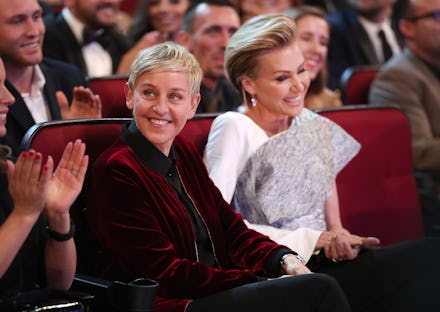20th Anniversary: Why Ellen DeGeneres' 'Time' magazine cover still matters

Few people can truly claim they helped change the way the world thinks. But on April 14, 1997 Ellen DeGeneres changed the LGBTQ conversation forever when she proudly posed for the cover of Time and proclaimed, "Yep, I'm gay."
Today the comedian, actress and talkshow host is one of the most admired and trusted women in the United States. And we aren't just saying that — DeGeneres really was named one of America's most trustworthy people in a Reader's Digest poll, and polled as one of the U.S.' most admired people in a 2016 Gallup poll.
However, Americans weren't always so keen on the idea of a lesbian comedian entering their living rooms on the TV every week. Following her coming out, her show, Ellen, was canceled due to slumping ratings and even had a bomb threat called in to the studio. DeGeneres' life before, during and after the cover may in fact be the perfect representation of the LGBTQ struggle in the United States over the last 20 years.
"Ellen DeGeneres is ... almost a litmus test of where we have been as a society," Dietram Scheufele, a communications professor at the University of Wisconsin, told NPR. "When she first came out and really put the issue of same-sex partnerships on people's agendas, and I mean people who really wouldn't have thought about it, I think the country was still in a very different state."
In a 2014 feature in People, DeGeneres remarked that she was surprised by the reaction the Time cover garnered. "I thought everyone knew me and I didn't think that one little adjective was going to define me," she said. "Now I look at it as a movie that I saw that someone went through, and I only experience the amazing life that I have right now."
It is perhaps that familiarity DeGeneres speaks of that matters most. As the New York Times reported, a survey conducted by GLAAD in late 2008 showed that the reason cited most frequently by people who reported having favorable views of LGBTQ people was knowing someone who is gay.
While the Times additionally noted that 79% of respondents said that knowing someone who is gay in person contributed to their more positive opinions, compared with 34% who said seeing gay characters on television was a factor, DeGeneres has transcended that television to real life barrier in a way no other celebrity has. While her first attempt at television failed and lead to a five-year career slump, DeGeneres has risen again and is now the host of the top-rated show in the talk genre, "growing 7% year-over-year among the daytime target demographic of women 25-54," according to the Hollywood Reporter.
However, it's her lesser-known viewership that is perhaps gaining the most from getting to "know" DeGeneres on the small screen over the last 14 years. While women still account for 73% of daytime television viewership, 81% of daytime viewers don't have college degrees, according to Pew, which is significant when considering 46% of those with a high school degree or less oppose same-sex marriage.
"Not only was [DeGeneres] by far the most frequently cited example of a gay or lesbian public figure in the general-population survey," Pew reported, "she and President Obama were the leaders when LGBT Americans were asked to name a well-known figure who's been important in advancing the rights of LGBT people."
And although gay marriage is legal, the fight is far from over. On Tuesday, North Carolina lawmakers attempted to introduce legislation that would outlaw same-sex marriage in the state one again. Additionally, 37% of Americans still oppose gay marriage.
The U.S. is moving in the right direction when it comes to equal rights for all, but perhaps DeGeneres can keep the nation dancing a little while longer to help everyone catch up.